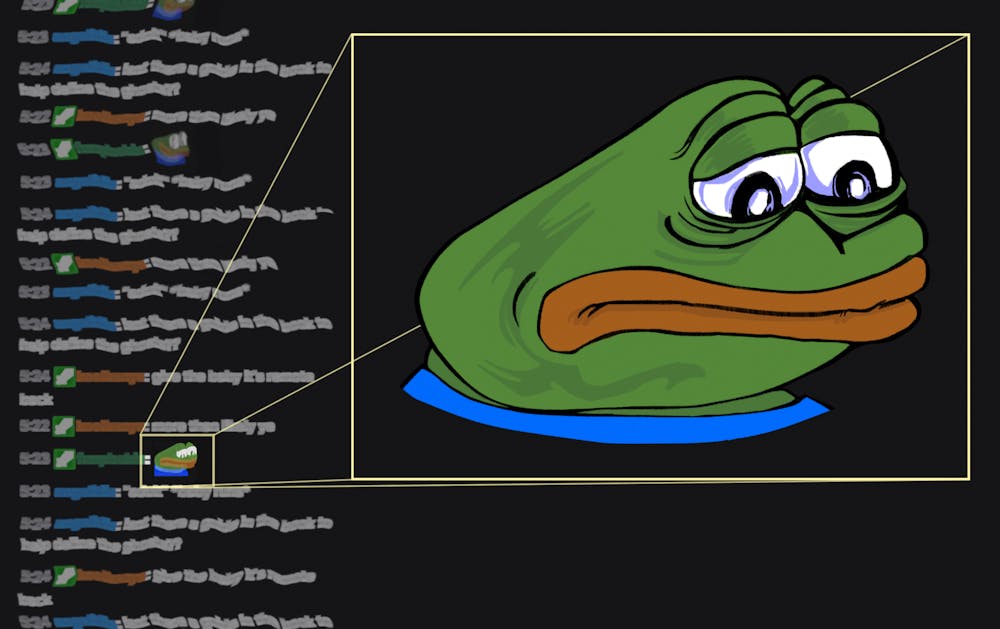Internet memes serve as an almost superlative template for disseminating popular, albeit commonly serving little substantive value, images and videos. Early internet memes or even more modern ones can make one cringe and wonder how they were propagated so widely.
The 2020 Sundance award-winning documentary "Feels Good Man," directed by Arthur Jones, aims to unearth the history and cultural fracturing of the internet meme Pepe the Frog through the "/pol/" 4chan sub-forum.
Matt Furie created Pepe as part of his online cartoon, "Boy's Club," that first appeared in 2005, featuring a combination of hedonistic and drug-infused misadventures of a group of four humanoid animal friends.
Furie could have never imagined what was once an artistic endeavor depicting light-hearted, frat-boy-like humor would devolve into its current association with white supremacy, emboldening both anonymous internet addicts and noxious right-wing extremists existing in the public realm.
The mellow-tempered Furie explains in an almost heedless tone the excruciatingly-long timeline of his illustration's appropriation, which initially spawned on anonymous message boards in various redrawn forms as a symbol of sadness and despair by 2008, according to one self-proclaimed "4channer" in the documentary.
In one of Furie's "Boy's Club" illustrations, he depicts Pepe relieving himself with his pants around his ankles. Later in the illustrated scene, another character asks Pepe about this, to which the latter character responds with the documentary's namesake: "Feels good man."
Furie, along with another illustrator and his partner, explains that the aforementioned frame is what essentially spurred the virality of the image.
The "feels good man" phrase was gobbled up by the anonymity of message boards. The Anti-Defamation League even has a pastiche of Furie's original illustration as a preface to its categorization of Pepe the Frog as a general hate symbol.
"Feels Good Man" touches on just how viral Pepe became, noting that American celebrities like Nicki Minaj and Katy Perry reposted iterations of the frog.
The documentary, along with its outspoken 4channer interviewee, illustrates how message board users attempted to "reclaim" their frog from the "normies" by making mutations of Pepe as abhorrent and politically-incorrect as they could.
Furie paid no mind to how Pepe's mutations continued to stray away from his original dorky, happy-go-lucky stoner image to more increasingly nefarious symbols.
Before his frog was implicitly associated with anti-Semitism and racial separatism, he even attempted to sell Pepe-centered merchandise to further capitalize on the expanding use of his work.
It only got worse when Donald Trump entered the race for president in 2015 and emphatically embraced the so-called "silent majority." Those weaponizing Pepe to sow hate found a candidate who spoke aloud what they were relegated to typing out anonymously and flocked to him.
They felt they discovered a human embodiment of their "Kek god" who relished in his political incorrectness and effectiveness in embedding trolling into political theatre.
With Trump's win, the 4channer interviewee recounted the celebrations of glee that ensued on /pol/ after "memeing Trump into the White House."
The documentary took a turn when Furie decided to symbolically kill Pepe off in a new comic strip, legally cement his ownership of his illustration and seek action against those profiting off of Pepe and the frog's now widely-understood link to neo-Nazism.
Furie notably aimed at fringe conspiracy theorist Alex Jones and won a settlement of $15,000.
Toward the end of the documentary, Furie attempts to reform his fragmented illustration into a symbol of love, but will ultimately never be able to fully reclaim Pepe's initial intent as a silly comic book character from the pernicious grip of white supremacy.
Watching this timeline of events woven together with entrancing animations is simultaneously jarring and disheartening. The concerningly intricate revisions of the meme show the people disseminating them are encased in their sphere of online ideology and are afforded the luxury of spewing their scarily fringe beliefs behind the anonymity of their message boards.
The insular virality of Furie's illustration is sad to watch in the rearview, as the loss of agency over his creation shows that in the post-internet era, artistic creations take on their own life form.
Reach the reporter at stellefs@asu.edu and follow @samtellefson on Twitter.
Like The State Press on Facebook and follow @statepress on Twitter.
Sam Ellefson is the Editor of State Press Magazine, leading a team of writers, editors and designers in creating four print issues each semester. Sam is a senior getting dual degrees in journalism and film studies and is pursuing an accelerated master's in mass communication at ASU.




